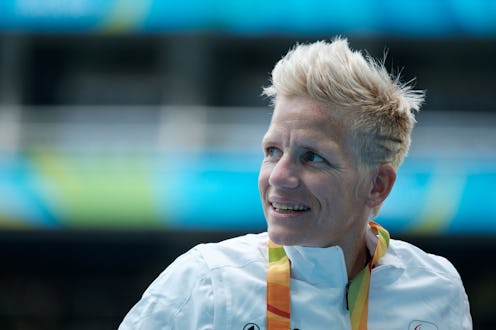TV & Movies
A New Documentary Follows Paralympian Marieke Vervoort’s Extraordinary Life
Director Pola Rapaport talks with Bustle about Addicted To Life.

Pola Rapaport knew she’d have to say goodbye to Marieke Vervoort, but she didn’t know when. The documentarian came across the athlete’s story in an article about the Rio 2016 Paralympics and was immediately drawn to her — her joie de vivre was infectious. Rapaport phoned colleagues at a television station in Belgium, Vervoort’s home country, to find the gold medalist’s contact information.
Like many athletes’ stories, Vervoort’s was one of perseverance in the face of adversity. But unlike most, she’d already chosen how hers would end. She was going to die by doctor-assisted euthanasia, and she would pick the date.
Vervoort lived with reflex sympathetic dystrophy, a chronic condition that causes extreme pain. Toward the end of her 30s, she started to lose strength, and the pain was becoming excruciating.
Over three years, Rapaport filmed the highs and lows as the athlete prepared to exercise her right to die per Belgium’s Act on Euthanasia, which allows people under certain conditions to choose doctor-assisted death. Rapaport, who developed a close friendship with the athlete, followed her subject-turned-friend through to the very end. (Vervoort passed away in October 2019.)
“She had control over her situation. That was the heart of it, because that I found incredibly beautiful,” Rapaport tells Bustle of the documentary, Addicted To Life, which has a New York premiere at the Chelsea Film Festival on Saturday, Oct. 14.
Below, Rapaport talks about some of the most difficult and triumphant moments of filming.
What drove you to pursue this story?
It was toward the end of 2016. I saw an article about a press conference given by Marieke. It really caught my attention. She spoke about how she had a very rare neurological, degenerative disease, which she suffered from for over 20 years, and which would eventually become fatal. She had decided to opt for the law in Belgium that allows a person to have a doctor assist them when it comes time to die.
I found her incredibly captivating and charismatic. Her message I found both paradoxical and yet it made total sense. If you can take control of how the end of your life will be, then you can really live to the fullest now, even if you may be experiencing weakening of your body.
Did you know from the beginning that you would want to follow Marieke until the very end?
I knew. I never knew how the story would progress or how long it would take, or if she would, in fact, opt for euthanasia. It’s an enormous decision, and it was still far off in the future [when we started filming]. But I felt that the real heart of the story was the emotional and psychological effect that having access to this law gave Marieke, this freedom to go on living.
Can you describe the moment that you realized Marieke had set a final date?
It wasn't shocking for me, because I knew her so well by that point. She had given me other dates and talked about it on three other occasions. I didn't know if she was really going to go through with it. I knew her parents very well by that point, and they seemed to acknowledge that this was going to happen.
It was heartbreaking to know that she was making a very firm plan, but I also knew that it was her wish.
What do you hope viewers take away from Marieke’s story?
I hope the audience walks away with an understanding of a unique character, a unique personality in Marieke Vervoort. She found reasons to keep living in the face of an incredibly challenging life. In the face of a slow, but profound decline in health, she continued to find reasons to live, to enjoy life, to experience as much as possible. [She found ways] to maintain and continue to build relationships with friends, admirers, family, and of course, to share her life with others.
This interview has been edited and condensed for clarity.